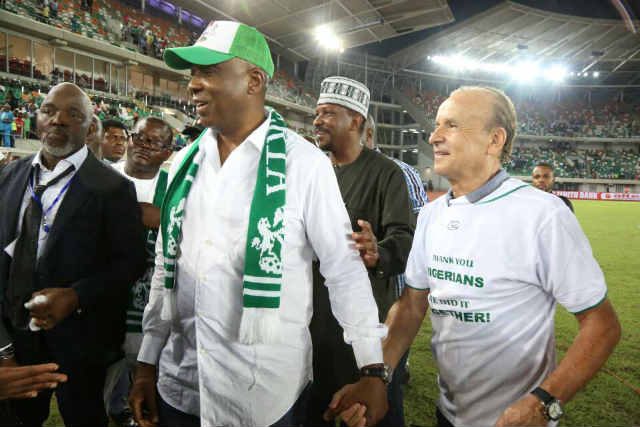 Gernot Rohr turned 65 on Thursday, two days after his Super Eagles team suffered a gut-punch style elimination from the World Cup at the hands of perennial nemeses Argentina.
Gernot Rohr turned 65 on Thursday, two days after his Super Eagles team suffered a gut-punch style elimination from the World Cup at the hands of perennial nemeses Argentina.
What a perfect birthday present it would have been for the German if his team had managed to keep the Argentines at bay for a few minutes longer to seal a place in the World Cup round of 16.
Instead, they were left ruing missed opportunities and packing their bags to head home, and Rohr was left to reflect on a somber day, as most of his players dispersed to various parts of Europe, while a few waited to board their flight home to Nigeria.
As if those rueful ruminations were not bad enough, there have been calls in certain quarters In Nigeria for Rohr to be relieved of his duties.
Commentary in the media have dwelled on the German’s failure to make the tactical and personnel changes required in the last few minutes to batten the hatches and hold on for the point that would have seen the Super Eagles advance.
Comparisons have also been made with the last World Cup in Brazil, where the late Stephen Keshi, a home-grown coach, took Nigeria to the round of 16 with way less support and preparation than Rohr had with the current squad.
All of this sacking talk completely misses the mark by failing to see the big picture, and instead, reverting to the same knee jerk reaction that follows every World Cup disappointment.
Why this should even be up for conversation points to Nigeria’s, and perhaps, Africa’s continued failure to establish anything beyond a tenuous toehold on world football’s biggest stage. No African side has reached the last 16 in Russia.
In 1994, after Clemens Westerhof had spent the previous five years building what amounts to Nigeria’s Golden Generation, he was frustrated into leaving immediately after the country exited that tournament.
Between the start of qualifying for the World Cup in 1998 and the end of the tournament, Nigeria had three coaches. Bora Milutinovic, who eventually led the team to France, barely waited for the final ball to be kicked before going on his merry way.
In 2002, Shuaibu Amodu negotiated a tortuous qualifying route, but was given the boot before Adegboyega Onigbinde was handed the reins for the tournament proper, and he took a scalpel to the squad. By the end of the tournament, he too made way.
For the 2010 tournament, Amodu again successfully guided the Super Eagles through qualifying hoops, and went as far as making it to the World Cup draws before he too was shown the door with months to go to the tournament. Swede Lars Largerback led the team to South Africa in his place, and was off back to Sweden by the time the final whistle went.
This cycle of hire, fire, repeat and reboot every four years does near irreparable damage both to the psyche of players, and the continued good health of the national team. Players are required to adjust to a new boss almost every other year, learning new tactics, working under different regimens.
Sometimes, on-field personnel changes that a new coach implements breaks up the existing rhythm, making it difficult for players to build any lasting chemistry.
And then there is that much-recycled word whenever a new coach takes the reins: “rebuilding”. Onigbinde, Christian Chukwu, Amodu, Samson Siasia, Keshi, Sunday Oliseh and more recently Rohr.
Since 2002, Nigeria has been stuck on a seeming time warp of ‘rebuilding’. And yet, the same core group of players form the nucleus of the team each time. Only Rohr, so far, has had the courage to break from the mold and actually work towards a proper long term plan by keeping his focus on young players.
He has significantly lowered the average age of the squad, found, developed and blooded a talented teen in Francis Uzoho, who could end up manning the goalpost for maybe the next 15-odd years, and introduced a style of play that appears to be the best way to exploit the personnel at his disposal.
Support InfoStride News' Credible Journalism: Only credible journalism can guarantee a fair, accountable and transparent society, including democracy and government. It involves a lot of efforts and money. We need your support. Click here to Donate
